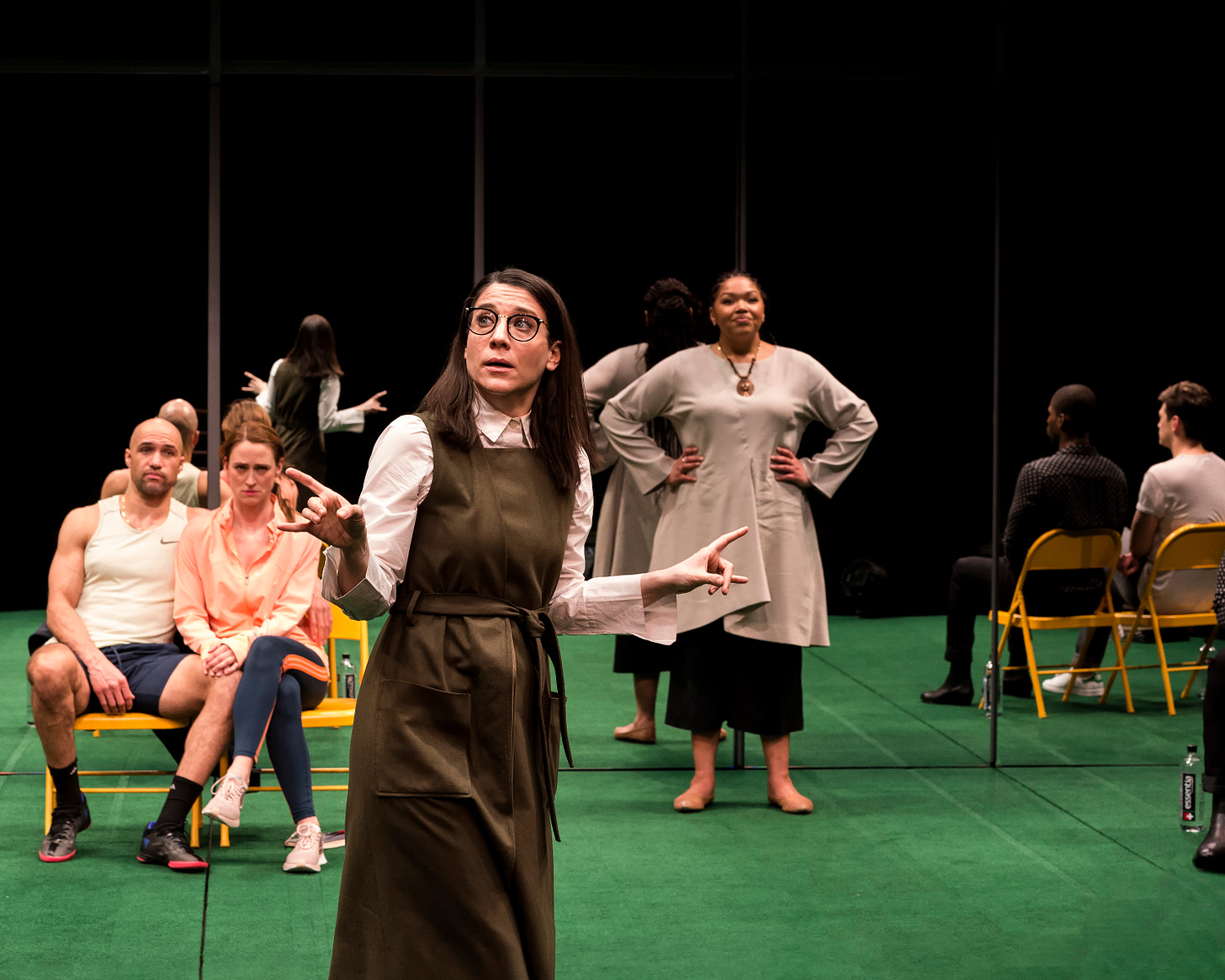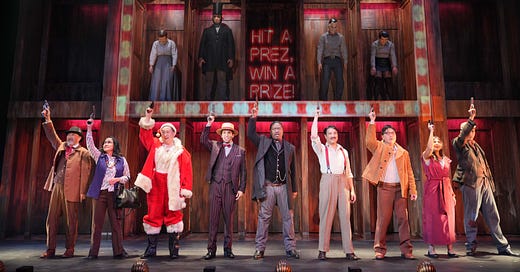The 'Hang Mike Pence' mob should make an entrance in Sondheim's boldest musical
Assessing 'Assassins' from East West and two other Sondheims. 'Slave Play' and 'Power of Sail" examine the residue of slavery. A Noise Within's 'All's Well' ends well.
“Hang Mike Pence.”
This was the most memorable slogan chanted by the January 6, 2021 rioters at the Capitol — you know, those concerned citizens who were engaged in “legitimate political discourse,” according to the Republican National Committee.
Televised recordings of their threat to assassinate Pence are often accompanied by images of the makeshift gallows that was erected nearby and of Pence being ushered away from the scene. Donald Trump later told an interviewer that the shouting of “Hang Mike Pence” by his supporters on that day was “common sense.”
Did it ever cross Stephen Sondheim’s mind in the last months of his life — between January 6 and November 26, 2021 — that he and book writer John Weidman might write a new scene for their musical “Assassins,” incorporating the would-be assailants of Pence into their list of characters?
Wouldn’t it make, well, “common sense” for any current dramatization of American assassination lore to include at least a brief reference to January 6, when advocacy of the unlawful execution of the Vice President emerged so openly and unashamedly from the shadows?
Unlike most of the historical assassination plots depicted in “Assassins,” the idea to hang Mike Pence wasn’t the closeted vision of one lone wolf. Groups of demonstrators brazenly cheered in unison for Pence’s capital punishment.
But that shouldn’t prevent them from some day entering the ranks of Sondheim’s would-be “Assassins.” In the musical, the musical’s many solo plotters — from different historical periods — unite to encourage each other’s individual efforts. So expanding the show to include at least one or two hang-Pence promoters wouldn’t necessarily require hiring a lot more actors.
These reflections were triggered Sunday by the re-opening of East West Players’ David Henry Hwang Theater, in Little Tokyo’s Union Center, with Snehal Desai’s smashing revival of “Assassins” — but no mention of Mike Pence or those who wanted to kill him.
Note the audacity of the timing. This musical about people who tried to kill presidents, and other political figures, opened on the eve of Presidents’ Day. Desai and company approached it with absolute confidence that it’s a masterpiece, not a show that must be carefully maneuvered into a time and place that will offend the least number of people.
The “place” itself — the Hwang Theater — impresses more than usual. The stage of this venue, a former church, has no outward thrust and sometimes has felt too flat. But Desai’s design team created a panel of individual compartments, like a giant-scale arcade game, that adds vertical dimension to the flat surfaces.
Desai cast the able Adam Kaokept as both the Balladeer, who is the show’s one voice of sanity and optimism, and — near the end — as Lee Harvey Oswald. This is hardly an unprecedented doubling of the two roles, but doing it now reinforces the show’s grimmest overtones, perhaps in an implicit reflection of the post-January 6 period.
The sound system, apparently improved during the COVID vacancy, entices us into the twisted “Assassins” saga with remarkable authority. Marc Macalintal’s music direction is top-notch, with cast members whose voices are a delight, even as they’re playing the weirdos who crawl through the script.
The show’s central irony — that we Americans often believe that we have the right to do whatever we want to be happy, without thinking about those who might be harmed as a result — resonates not only in the attempted assassinations, but tacitly when we consider our recent experiences with COVID. Many Americans resisted vaccines simply in order to make personal statements, regardless of public-health considerations.
LA’s history with “Assassins” also began in downtown LA — at Los Angeles Theatre Center in 1994. That production moved in 1995 from a small LATC venue to a midsize stage next door, but it didn’t receive enough support there to sustain the greater expenses. This time, let’s hope that this boldest of Sondheim’s many masterpieces will finally get the LA audiences that it deserves.
Two other productions of Sondheim scores appeared in recent weeks, but they pale in comparison to East West’s “Assassins.”
“Marry Me a Little,” at International City Theatre in Long Beach, is a 41-year-old revue of then-little-known Sondheim songs “that got away” — often because they were cut from then-better-known shows. It was assembled by Craig Lucas and Norman René, not by Sondheim. Now, decades later, most Sondheim fans who are older than, say, 30. will be familiar with most of these songs anyway. But these fans might grow tired of the shallow texture of the Lucas/René concept, in comparison to the dramatic depths of full-fledged Sondheim musicals.
One of those musicals is “A Little Night Music,” which Knot Free Productions is presenting in a small-theater production at the Greenway Court, on the Fairfax High School campus. The most distinctive feature of Ryan O’Connor’s staging is the casting of nonbinary actors Ty Deran and Amanda Kruger as the two younger characters who have more ambiguous sexual feelings — and repressions — than any of the others in Hugh Wheeler’s book (which was adapted from the Ingmar Bergman film “Smiles of a Summer Night”). But the overall production doesn’t otherwise stand out from any previous versions I’ve seen.
‘Slave’ and ‘Power’ plays
Last week two plays that reflect on the psychological residue of slavery, in very different ways, received local premieres at two big-deal venues: “Slave Play” at the Mark Taper Forum, and “Power of Sail” at the Geffen.

“Slave Play” is the much bigger deal, thanks to its Broadway production, which yielded 12 Tony nominations (but no wins). The LA production created its own news before it opened — last September 30, playwright Jeremy O. Harris publicly threatened to cancel the Taper production after CTG announced upcoming seasons at the Taper and Kirk Douglas Theater that would be written almost entirely by men. Within a week, CTG had pledged that this gender imbalance would be rectified by a preponderance of works by women in the subsequent seasons — and “Slave Play” proceeded as planned. After all that, perhaps it was inevitable that the play itself might feel slightly anticlimactic.
Harris apparently has a lot of faith in the drama that arises naturally from therapy sessions. This two-hour play, with no intermission, is set entirely at a former plantation in Virginia that is now used as a therapy center.
Three interracial couples thrash out their feelings about their relationships — first while role-playing as master/slave couples from the days of slavery, then while discussing these sessions with the other couples. The treatment is supervised by two women therapists — who are also an interracial couple. All of the couples are onstage until a final scene, in which one couple is singled out — somewhat arbitrarily — and observed in their hotel room as they attempt to deal with the treatment’s revelations in private.
I became impatient with the format — and the lack of information about these characters and their relationships from the wider world outside the therapy sessions. Sure, therapy can result in drama — but it needs to be shaped, edited, and placed in a larger context by the playwright.
On the other hand, Robert O’Hara’s staging of “Slave Play” is in much better shape than the relatively untested “Power of Sail,” staged by Weyni Mengesha at the Geffen. Paul Grellong’s “Sail” appears to be more of a star vehicle for Bryan Cranston than an illuminating chronicle of a controversial situation.
Cranston plays a Harvard professor, nearing retirement, who created controversy by inviting a young white-supremacist and antisemitic firebrand to appear at a symposium on campus. But we never meet the young lightning rod himself.
We do meet a few of those opposed to his appearance, from black and Jewish perspectives. But the chronology is confusing, and the plot becomes bogged down by seemingly subsidiary developments — involving a dean played by Amy Brenneman — that prevent the coalescing of a climax. The relatively obscure title of the play is no help.
’All’s Well’ ends well, “Detained’ and ‘Alive’ lack life
Speaking of excessive plotting, does anyone outside the world of professional Shakespeare scholars remember what is the “all” that “ends well” in Shakespeare’s comedy “All’s Well That Ends Well”, at least in between its rather rare productions? Go look it up — it’s too complicated to explain here.

This play wasn’t one of the Bard’s more memorable turns as a storyteller, but it nonetheless serves as a sprightly and refreshingly unfamiliar vehicle for the post-COVID return of Shakespeare to Pasadena’s A Noise Within, in Nike Doukas’ fluidly staged and elegantly designed rendition. Erika Soto and Deborah Strang are strong and fierce as the leading women in a play where the women really lead.
Back to topical theater, briefly — I was disappointed by two productions at prominent small theaters over last weekend.
France-Luce Benson’s “Detained” at the Fountain Theatre is about individuals detained by ICE, but it feels somewhat scattered, wandering in a vague middle ground between documentary and fiction. without enough focus on any one character’s conflict.
At the Odyssey, John Fleck’s “it’s alive, IT’S ALIVE!” is billed as “musical satire that reflects on our national panic in the face of the pandemic,” but those reflections don’t really extend beyond the bubbleheaded helmets resembling virus particles. In short, Fleck still has style, but he doesn’t seem to have anything distinctive or personal to say about the COVID experience.
.
.




